New research out of Michigan State University found that the number and type of microbes present in the saliva of pregnant women differ according to whether they are experiencing life stress and symptoms of anxiety, depression and post-traumatic stress disorder.
The study — published in the open access journal BMJ Mental Health — is the first to look at the association between the type and number of microorganisms in the mouth and throat, also known as the oral microbiome, and maternal mental health.
The study included 224 pregnant women enrolled in the Michigan Prenatal Stress Study who were assessed for recent stresses and mental health symptoms during their second trimester. Women were asked to provide saliva samples during the week of their assessments. The results showed the oral microbiome varied based on whether women had reported symptoms of life stress, anxiety, depression or post-traumatic stress disorder, also called PTSD, during the assessments.
“Positive mental health is crucial for mothers’ well-being and their ability to sensitively care for infants,” said Joseph Lonstein, professor in MSU’s Department of Psychology and lead researcher on the study. “We hope our study will stimulate future research on how microbes in and on our body, other than those in our gastrointestinal tract that are already often studied, are associated with mental health in mothers and even people who are not mothers.”
Oral microbiomes of women with high anxiety or depression symptoms showed a high alpha diversity, which means they included many types of microbe species present at relatively even levels. Oral microbiomes of women with high levels of PTSD symptoms instead showed high beta diversity, which means the specific microbe species in their saliva notably differed from the species found in women with low PTSD symptoms.
Specific stress and mental health traits were also associated with high levels of certain microbe species.
The researchers said that their findings suggest that the oral microbiome could be a potential target for interventions to improve poor psychological well-being during pregnancy.
“Successful targeting of the gut microbiome with probiotic treatment to improve maternal mental health could be extended in future studies to target oral cavity microbes through dietary changes, making recommendations for improving oral health, and probiotic treatments that might benefit mothers struggling with high life stress and poor mental health,” the team of researchers said.


